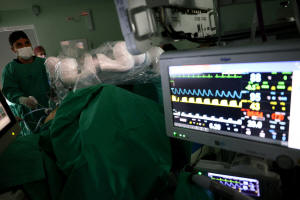|
The
MARS surgical platform at the Luis Tisne hospital in Santiago
allows surgeons to "attach a small magnet to organs, like the
liver, and use robotic arms with high powered magnets on the
patientís belly to manipulate organs out of the way," according
to Levita Magnetics, the California-based start-up that created
robot.
The system also "gives the surgeon control of the camera, which
allows for better visualization, it is much more stable. And in
surgery, seeing is everything," said Alberto Rodriguez-Navarro,
doctor and founder of Levita Magnetics, the California-based
start-up that developed the MARS platform.
"It is better for the patient, with fewer incisions and less
pain, faster recovery," Rodriguez-Navarro told Reuters after the
surgery.
"For the surgeon, it's better since it allows him to be more
efficient and, for the system, it allows more surgeries to be
done per day."
The platform was cleared by the U.S. Food and Drug
Administration in September and conducted its first commercial
surgery at the Cleveland Clinic in Ohio in October.
(Reuters Television report, written by Natalia Ramos; Editing by
Aurora Ellis)
[© 2023 Thomson Reuters. All rights
reserved.] Copyright 2022 Reuters. All rights reserved. This material may not be published,
broadcast, rewritten or redistributed.
Thompson Reuters is solely responsible for this content.

|
|




